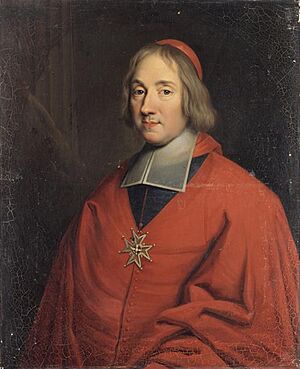Louis Antoine de Noailles facts for kids
Quick facts for kids His Eminence Louis Antoine de Noailles COHS |
|
|---|---|
| Cardinal, Archbishop of Paris, Duke of Saint-Cloud, Peer of France |
|

Portrait attributed to Hyacinthe Rigaud
|
|
| Church | Roman Catholic Church |
| Archdiocese | Paris |
| See | Notre-Dame de Paris |
| Enthroned | 19 September 1695 |
| Reign ended | 4 May 1729 |
| Predecessor | François de Harlay de Champvallon |
| Successor | Charles-Gaspard-Guillaume de Vintimille du Luc |
| Other posts | Bishop of Cahors Bishop of Châlons |
| Personal details | |
| Born | 27 May 1651 Château de Teyssiére, Auvergne, France |
| Died | 4 May 1729 (aged 77) Paris, France |
| Nationality | French |
| Alma mater | College of Sorbonne, Paris |
| Coat of arms |  |
Louis Antoine de Noailles (born May 27, 1651 – died May 4, 1729) was an important French religious leader. He was a bishop and later a Cardinal. He was also known as Cardinal de Noailles. He helped end a big religious debate called the Jansenist controversy by signing an important document in 1728.
Contents
Life of a Cardinal
Early Life and Education
Louis Antoine de Noailles was born in France on May 27, 1651. His family was very important. His father was Anne, the first Duke of Noailles. His mother was Louise Boyer. She used to work for Queen Anne of Austria.
Noailles studied at the Sorbonne university. He earned a special degree in theology (the study of religion) in 1676.
Rising Through the Church
In 1679, Noailles became the bishop of Cahors. He served there for a short time. In 1680, Pope Innocent XI moved him to lead the diocese of Châlons-sur-Marne. This position also made him a peer of France. A peer was a noble with special rights.
In 1695, King Louis XIV made him archbishop of Paris. This was a very important job. He also became the Duke of Saint-Cloud. In 1700, Pope Innocent XII made him a Cardinal. This is one of the highest ranks in the Catholic Church.
A Kind Leader
Louis Antoine de Noailles was known for being a good and active leader. He cared about people. In 1709, there was a terrible famine. He sold his own silver dishes to raise money. This money helped feed people who were starving. He also spent a lot of his own money to redecorate Notre Dame Cathedral in Paris.
Friends and Challenges
Noailles was friends with François Fénelon, another important religious thinker. They had studied together. However, Noailles was among the bishops who disagreed with some of Fénelon's ideas. This disagreement affected Fénelon's career.
Noailles also became friends with Count Nicholas Ludwig von Zinzendorf. Zinzendorf was a Lutheran from Germany. They met in 1719 and felt a strong spiritual connection. They kept in touch through letters. Noailles even joined Zinzendorf's secret group called the Order of the Grain of Mustard Seed. This group worked to spread God's kingdom. Noailles also became the godfather to Zinzendorf's son.
In 1719, Noailles showed how strong his moral beliefs were. The daughter of the Regent, Louise Élisabeth, was very sick. She was giving birth to a child outside of marriage. The local priest refused to give her religious services. The Regent, Philip II, Duke of Orleans, asked Noailles to change the priest's decision. But Noailles firmly supported the priest.
Religious Debates
Noailles had a complicated relationship with the Jansenists. Jansenism was a religious movement. While he disagreed with some of their ideas, some people thought his own teachings sounded a bit like Jansenism. He also opposed the Jesuits, who were attacking the Jansenists.
There was a big debate about a document called Unigenitus. This was a papal bull (an important order from the Pope) from 1713. Noailles disagreed with it for a long time. He even went against the Pope's wishes. But in 1728, just before he died, he suddenly changed his mind and signed it.
Louis Antoine de Noailles passed away on May 4, 1729. He was replaced as archbishop of Paris by Charles-Gaspard-Guillaume de Vintimille du Luc.
Sources
 This article incorporates text from a publication now in the public domain: "Louis-Antoine de Noailles". Catholic Encyclopedia. (1913). New York: Robert Appleton.
This article incorporates text from a publication now in the public domain: "Louis-Antoine de Noailles". Catholic Encyclopedia. (1913). New York: Robert Appleton.
| Catholic Church titles | ||
|---|---|---|
| Preceded by François de Harlay de Champvallon |
Archbishop of Paris 1695–1729 |
Succeeded by Charles-Gaspard-Guillaume de Vintimille du Luc |
 | Kyle Baker |
 | Joseph Yoakum |
 | Laura Wheeler Waring |
 | Henry Ossawa Tanner |

